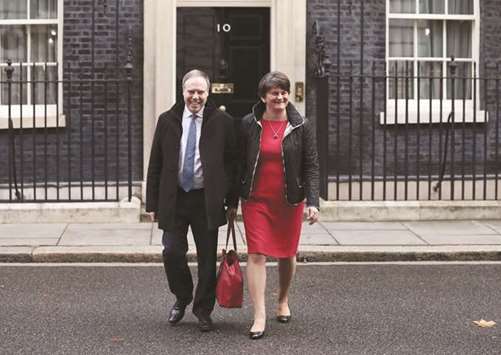Northern Ireland’s main political parties yesterday pointed to fresh obstacles to restoring a devolved power-sharing government in the British region after meeting Prime Minister Theresa May, who urged them to resume talks next week.
The province has been without a regional government for almost a year, destabilising the delicate balance between Irish nationalists and pro-British unionists that has already been shaken by Britain’s vote to leave the European Union.
The latest efforts at breaking the stalemate in Belfast collapsed this month, prompting Britain to begin setting a budget for the province, a major step towards imposing direct rule from London for the first time in a decade.
The head of the pro-British Democratic Unionist Party (DUP) Arlene Foster accused Irish nationalist rival Sinn Fein — the former political wing of the Irish Republican Army — of the “glorification of terrorism” in a party conference last weekend.
Sinn Fein leader Gerry Adams in turn accused May of “acting in bad faith” by including a potential statute of limitations covering crimes by British forces in a planned consultation on new laws to deal with the legacy of Northern Ireland’s 30 years of sectarian violence.
May struck a more positive tone, saying the issues dividing the parties were relatively few and that she believed an agreement could be reached.
In Dublin, Irish Prime Minister Leo Varadkar said that if an administration could not be formed, he would seek a meeting in the New Year of the British-Irish Intergovernmental Conference, a joint decision making body recognising the Irish government’s special interest in Northern Ireland that last met a decade ago.
Analysts have said a fresh round of talks is unlikely to be even contemplated until after both parties’ annual conferences, culminating with the DUP’s meeting on Saturday.
The DUP has said it was upset by prolonged cheering at Sinn Fein’s annual conference at the weekend after MP Elisha McCallion spoke of former Northern Ireland deputy first minister Martin McGuinness’ pride in his role in the IRA.
The IRA killed hundreds in its campaign against British rule before a ceasefire in 1994.
Around 3,600 died on all sides in the conflict, fought over whether Northern Ireland should be part of the United Kingdom or Ireland, before it ended with a 1998 peace agreement.
“It was quite disgraceful to look at the glorification that happened at the weekend of the IRA and terrorism and of course that makes it more difficult for us,” Foster, whose father narrowly escaped alive from an IRA shooting, told reporters.
Foster, who warned ahead of the talks that further steps towards direct rule looked inevitable unless there is a change of direction, said her party remained committed to devolution.

Arlene Foster, leader of the Democratic Unionist Party (DUP), and her deputy Nigel Dodds leave 10 Downing Street, London, yesterday.
